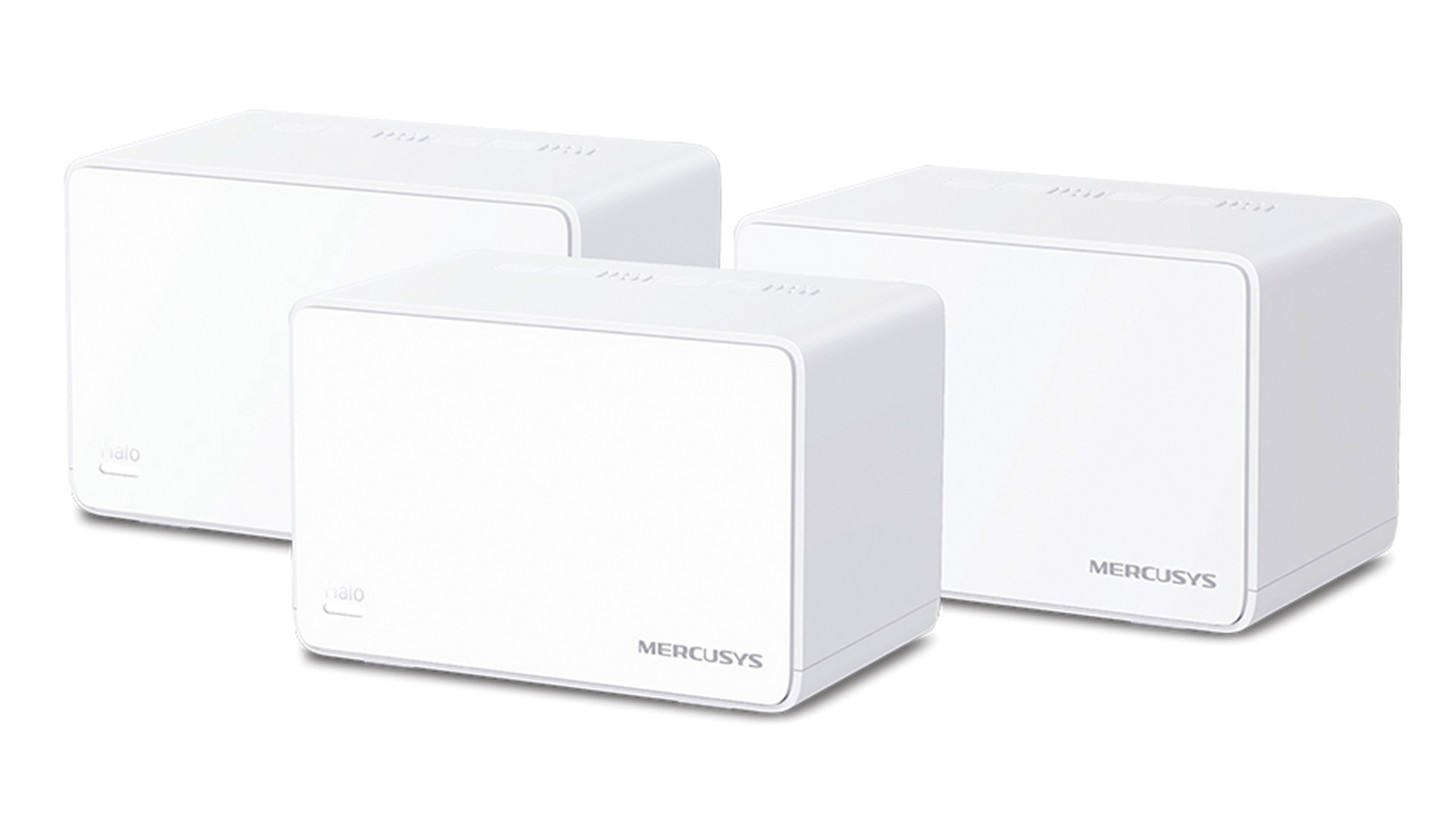Mercusys Halo H80X review: Without question the best-value mesh around
This unfancy Wi-Fi 6 mesh provides all the performance and coverage you're likely to need at an excellent price


-
+
Affordable
-
+
Speedy data transfers
-
-
No third radio for backhaul

You might not recognise the name Mercusys – it's a new subsidiary of networking giant TP-Link, focused on low-cost networking systems for the mainstream market. That might sound unambitious, but the Halo H80X Wi-Fi 6 mesh represents a very strong debut for the brand.
The design is about as simple as it could be, consisting of a pair or trio of rather plain white boxes. They're not ugly, though: with a small footprint of 128 x 81mm the Halo units are cute and unobtrusive, and the air vents on top are decorated in a tasteful pattern of grooves. A single LED on the front shows your connection status, while three Gigabit Ethernet connectors are available at the rear.
And there's decent wireless hardware inside. Each unit contains a legacy 2.4GHz Wi-Fi 6 radio, plus a 5GHz radio supporting 2x2 MU-MIMO and the maximum 160MHz radio channel width, for speedy data rates of up to 2.4Gbits/sec. Note that not all of that bandwidth will be available for your devices, though: since there's no third radio for backhaul, the main 5GHz connection handles both client connections and station-to-station traffic.
It's also worth being clear that the Halo H80X doesn't support Wi-Fi 6E. That's not a huge problem: it means modern 6E-compatible phones and laptops won't get the performance advantages of the 6GHz frequency band, but those devices will simply connect to the Halo's 5GHz network instead, along with regular Wi-Fi 6 clients.
And we're pleased to say that 5GHz performance is more than satisfactory. We confirmed this by testing the Halo H80X at home, with one unit in the study and another at the opposite end of the adjoining bedroom. Mercusys suggests that two units are enough to cover a home of up to 460m2, but if you're lucky enough to live in a larger dwelling you can buy a three-pack (for around £80 more) with a claimed coverage of up to 650m2.
With the Halo stations in place, we used a standard test laptop (equipped with an Intel AX210 Wi-Fi card) to copy a series of 100MB files to and from an Asustor NAS appliance attached to the primary mesh node, and measured the average transfer speeds. You'll probably use the Halo more for internet access than for moving data back and forth between local devices, but testing this way ensures the wireless connection isn't bottlenecked by the broadband line.
Indeed, that would certainly have been the case here. With the laptop in the same room as the primary mesh node, we measured a superb download speed of 80MB/sec – equivalent to an internet connection running at more than 600Mbits/sec.
Sign up today and you will receive a free copy of our Future Focus 2025 report - the leading guidance on AI, cybersecurity and other IT challenges as per 700+ senior executives
Things weren't quite as fast in other rooms, but the Halo kept us happy with strikingly consistent downloads throughout the house. We measured 36MB/sec in the downstairs living room, 37MB/sec in the kitchen, 38MB/sec in the bathroom and 42MB/sec in the bedroom.
If you're looking for the very best Wi-Fi speeds, you can do better than this. Across different rooms the Netgear Orbi RBK763S was between 20% and 85% faster. Step up to a Wi-Fi 6E system such as the TP-Link Deco XE75 or the Netgear Orbi RBKE963 and you can get downloads at almost twice the speed of the Halo, up to a massive 118MB/sec.
However, those systems are all far more expensive, with current prices ranging from £343 for the Deco XE75 to an enormous £1,699 for the Orbi RBKE963. Within its price range, the Halo H80X is an exceptional performer, easily outpacing sub-£200 rivals such as the Huawei Mesh 3.
In fact, the Halo is fast enough that most people won't need to spend any more. Disney+ recommends a connection speed of 25Mbits/sec for 4K HDR video streaming, equivalent to around 3.5MB/sec – and with the Halo mesh I got at least ten times that in every room of my home.
The Halo H80X is easy to manage, too, thanks to the Mercusys mobile app – a rebadged version of the Deco app that works with TP-Link's pricier meshes. The main dashboard gives you a handy overview of your network status and connected devices, and it takes only a few taps to configure things such as IP address reservation and port forwarding. There's a decent parental control feature, too, with time limits and web-filtering options for kids' devices. The one thing that's noticeably missing, compared to the Deco app, is any sort of security function.
On TP-Link-branded routers and meshes, the optional HomeShield service offers on-demand network scans and active threat detection; there's no equivalent here, so you'll need to look after your own security.
Even without that feature, the Halo H80X has plenty going for it. It has all the bandwidth you need for everyday streaming, gaming, web surfing and video calls, and its superbly even coverage means you won't be traipsing from room to room to find the best signal. That being the case, the price is a steal: if you're seeking an affordable Wi-Fi upgrade for your home or small office, this is without question the best-value mesh around.
Mercusys Halo H80X specifications
| Band support | Dual-band |
| Radios | 2.4GHz/5GHz |
| Additional features | Wi-Fi 6 router and satellites |
| Dimensions (WDH) | 128 x 81 x84mm |
| Weight | 560g |
| Warranty | 2yr limited warranty |
Darien began his IT career in the 1990s as a systems engineer, later becoming an IT project manager. His formative experiences included upgrading a major multinational from token-ring networking to Ethernet, and migrating a travelling sales force from Windows 3.1 to Windows 95.
He subsequently spent some years acting as a one-man IT department for a small publishing company, before moving into journalism himself. He is now a regular contributor to IT Pro, specialising in networking and security, and serves as associate editor of PC Pro magazine with particular responsibility for business reviews and features.
You can email Darien at darien@pcpro.co.uk, or follow him on Twitter at @dariengs.
-
 CISA’s interim chief uploaded sensitive documents to a public version of ChatGPT – security experts explain why you should never do that
CISA’s interim chief uploaded sensitive documents to a public version of ChatGPT – security experts explain why you should never do thatNews The incident at CISA raises yet more concerns about the rise of ‘shadow AI’ and data protection risks
By Ross Kelly Published
-
 Former Google engineer convicted of economic espionage after stealing thousands of secret AI, supercomputing documents
Former Google engineer convicted of economic espionage after stealing thousands of secret AI, supercomputing documentsNews Linwei Ding told Chinese investors he could build a world-class supercomputer
By Emma Woollacott Published
-
 OpenAI admits 'losing access to GPT‑4o will feel frustrating' for users – the company is pushing ahead with retirement plans anway
OpenAI admits 'losing access to GPT‑4o will feel frustrating' for users – the company is pushing ahead with retirement plans anwayNews OpenAI has confirmed plans to retire its popular GPT-4o model in February, citing increased uptake of its newer GPT-5 model range.
By Ross Kelly Published
